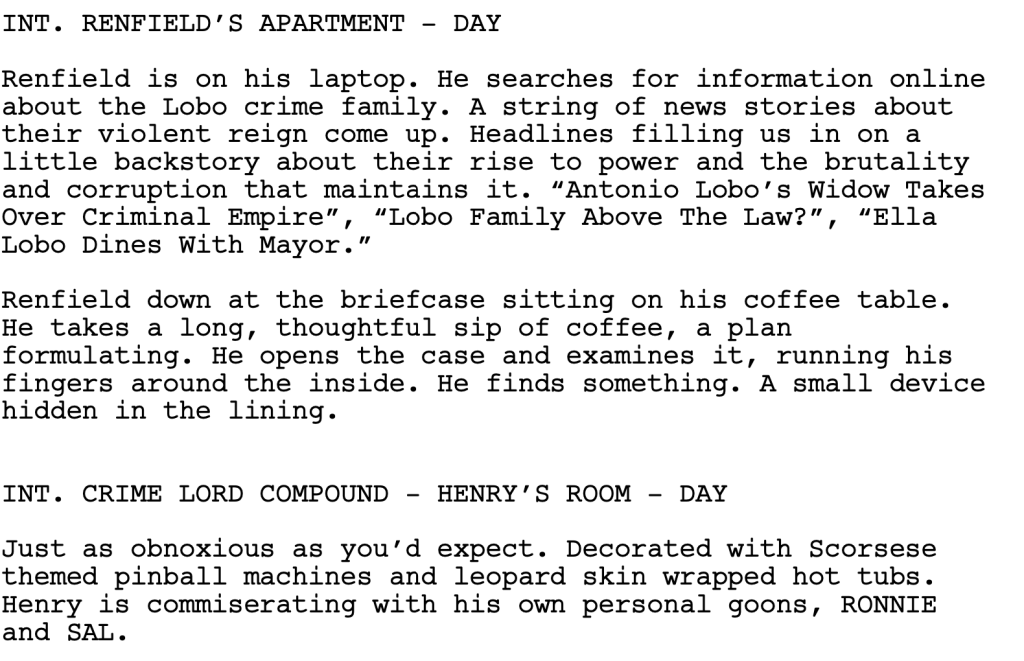Genre: Horror/Comedy/Action
Premise: In modern day Detroit, Dracula’s eponymous servant, Renfield, is fed up with his abusive boss. So he puts in motion an exit strategy.
About: This is a project that came together two years ago with horror superstar Robert Kirkman (The Walking Dead) coming up with the idea. It’s part of the new Universal mandate to explore their ‘monster’ IP as a set of unique films as opposed to an interconnected universe (a la Avengers). The project is written by Ryan Ridley (Rick & Morty), will be helmed by Chris McKay (Tomorrow War), and will star Nicholas Hoult. It’s important to note that this is the 2019 draft so the script has likely evolved since then.
Writer: Ryan Ridley
Details: 98 pages
Readability: Very Slow
This is a pretty neat idea.
Take one of the most famous characters of all time – Dracula – and introduce a part of him that most people don’t know about – his servant, Renfield. Because the nature of servitude is humorous in a modern context, you make it a comedy.
For those of you trying to come up with a concept that lands with people, it’s always good to use characters who are known to audiences. I don’t see “Renfield” being nearly as compelling if Renfield is serving some vampire named Jake. The fact that we’ve got THE BIGGEST MOST RECOGNIZABLE vampire of all time is what gives the concept pop.
Now let’s see if the script is any good.
We’re in Detroit, Michigan, one of the worst cities in the United States. It’s here where we meet Renfield, a 40-something aging-hipster type, in his weekly support group for co-dependents – people who are stuck in abusive relationships that they don’t have enough self-esteem to leave.
After listening to one of the women in the group talk about how her partner sucks, we follow Renfield to an apartment, see him eat a cockroach, gain superhuman powers, then kill the man who we realize is the significant other of the girl in the group. While this is happening, ANOTHER person comes into the apartment – a hitman who also wanted to kill the significant other, and Renfield kills him too.
Renfield then takes the significant other’s suitcase, which it turns out is filled with drugs, as well as the significant other’s body, and brings it back to the sewers, where his master, Dracula, sucks him dry. Renfield then goes home to his apartment. What he doesn’t know is that because of that suitcase, the city’s biggest drug lord, Ella Lobo, is now after him.
Cut to a cop with a serious anger problem named Rebecca. Rebecca is tasked with figuring out what happened in this apartment. She eventually realizes that this Renfield guy is involved. Which means the cops are after Renfield too. When she catches up to Renfield, he falls in love with her, but she hates him because she thinks he’s a serial killer. Their relationship gets even more complicated when he informs her that he’s been Dracula’s servant for the past 100 years and he gains superpowers when he eats bugs.
After the cops catch and throw Renfield in jail, Rebecca really wants to take down the Lobo family and, therefore, breaks Renfield back out of jail and teams up with him. But, wouldn’t you know it, as this is happening, Ella Lobo makes a deal with Dracula, which means that Renfield and Rebecca aren’t just going to have to take down the Lobos. They’re going to have to take down the master himself!
I’ve only seen a few episodes of Rick and Morty but the fact that this is what today’s screenwriter is known for is telling. From the couple of times I’ve watched the show, I’ve found the jokes to be fast and furious and come from everywhere. That crazy disjointed nature is part of why so many people love the show.
But while that may work in half-hour animation, it does not work in a 100 minute feature. As you’ve heard a million times on this site, features need focus (FNF) and “Renfield” doesn’t have any. It doesn’t seem to know what it wants to be. The engine driving the story changes every ten pages.
You can chalk some of that up to an early draft. But I’ve read a lot of first drafts that eventually became movies and what I’ve learned is that if the foundation isn’t solid in that first draft, the story never gets good no matter how many drafts you do.
I mean we start off with Renfield killing people for his master. So far, so good. Then we learn Renfield eats bugs to generate superpowers. That is not a very good idea. Then we have a bag of drugs dictating the plot. Okay, so we’ve just gone from an original concept to a generic one. Then we switch main characters for a while and Rebecca becomes our lead. At this point, the script is off the rails. Now Renfield is considered a serial killer by the FBI so everybody tries to capture him. I’m happy that the writer really liked Silence of the Lambs but that is the wrong plot development for this script. Oh wait, now it’s a team-up movie! Renfield and Rebecca become a buddy-cop team to take down the bad guys.
Again, you can get away with this type of concept-jumping in half-hour animation because the time is short and the level of emotional investment is low. But with a 100-minute movie, you have to build up investment in the characters, as well as the plot, and that requires patience and focus. If you start jumping around to any plot point that you fancy in that moment, the audience will tune you out. Which is what happens here.
Another person who read the script told me they couldn’t even get out of the first act due to how scattered the plot was.
At least one part of the script works: Renfield’s co-dependency support group. If you remember, I told you the other week that you want to be doing MORE THAN ONE THING in your scenes. That’s what the co-dependency group does. First, it cleverly establishes that Renfield is in a bad relationship (with Dracula) that he is trying to get out of. Second, this is also where he finds his victims for Dracula. He gets the names of these support group members’ evil significant others, seeks them out, and takes them to his master.
When I read that, I said, “Okay, this could be good.”
But literally everything that follows doesn’t work.
Just this idea that he eats a cockroach or a centipede and, all of a sudden, becomes a superhero… I’m sorry but that’s not a good idea. How do you even rationalize that connection? That bugs can provide powers? At least with Ratcatcher 2 (from The Suicide Squad) she had an entire backstory about how she learned to control rats. It was baked into her character. This just felt like one of those exhausted 3am throwaway ides – “What if he like…. GAAINED SUPERPOWERS WHEN HE ATE BUGS???”
Another problem with the script is one I hadn’t considered, which is that you have this looming shadow over the whole story that is Dracula. He is the reason we’re here. As I stated earlier, the movie doesn’t work if Renfield is a servant to Random Vampire Jeff. It works because he’s a servant to the biggest vampire of all time.
And therein lies the problem. We want Dracula. But the more Dracula you show, the more you overshadow Renfield. So what do you do? Neither Kirkman nor Ridley seems to have the answer. Oddly, Renfield doesn’t even live with Dracula. Dracula lives in the sewer system while Renfield lives off in some apartment somewhere. So they’re not even around each other for 90% of the screenplay. That seems like a miscalculation in a movie about a master and servant.
I’m not the comedy expert but I’m thinking your comedy is going to come from your actual concept – which is that Renfield is the servant to Dracula. The comedy isn’t going to come from some 30 year old drugs-in-a-suitcase plotline.
Some of the choices here are kind of baffling to be honest.
You may have noticed that I’ve added a new category to my reviews – READABILITY. Why did I do this? I realized that one of the most important qualities for a script is HOW EASY IT READS. I’ve read 150 page scripts that were breezy reads and 90 page scripts that felt like my eyes were sinking in quicksand. As spec screenwriters, your script’s ‘readability’ should be a top priority.
Readability refers to having a clear and concise writing style. For example, some writers love to be clever. But cleverness only complicates the read, especially if you’re not very good at it. So be clear and concise. You also want to say as much as possible in as few word as possible. Most of the things you say in six lines you can say in three. And finally, some writers have a natural ability to blend words together in a way that’s pleasing to read. All those things make for an easier reading experience.
“Renfield” was clunky. It was unclear. There were giant paragraphs for days. And this is a comedy script. Comedy is the one genre where the readability has to be light-speed. If it’s even medium, its’ not going to work. So “Renfield” was really disappointing on that end.
I wish I had more good things to say about Renfield but unless they’ve come up with a completely different take on the subject matter since this draft, I’m going to say that this project has an uphill battle. The one argument you can make is that it’s comedy and, as we all know, comedy is subjective. I know tons of people who LOVE Rick and Morty so it may be that I just don’t get the comedy here. Which wouldn’t be the first time (I had a lot of these same criticisms for the “Ted” script, for example, and that movie went on to be a mega-hit). So we’ll see. I just wish there was a clearer vision on the page.
[ ] What the hell did I just read?
[x] wasn’t for me
[ ] worth the read
[ ] impressive
[ ] genius
What I learned: “MARK, 50s, a gentle giant a la John Carrol Lynch, the leader of this support group.” Don’t use obscure real person references in your screenplays. Nobody knows bit actors’ names. Even if they did, when you make references like this, it looks amateur. This is a Screenwriting 101 mistake.



